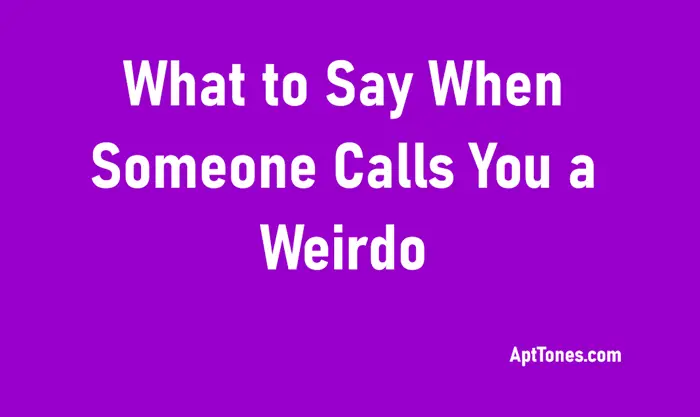Encountering negative labels in social interactions, such as being called a “weirdo,” is not uncommon. This term, often used to alienate or belittle, can be a source of discomfort or hurt.
However, how we respond to such labels can profoundly influence our self-perception and the dynamics of our social interactions. The art of responding to being labeled a ‘weirdo’ involves a blend of self-awareness, emotional intelligence, and communication skills.

20 Things To Say When Someone Calls You a Weirdo
This article delves into 20 thoughtful and empowering responses to such a situation, each designed for different contexts and intended to promote positive and respectful dialogue.
1. The Affirmation of Uniqueness
“I embrace my uniqueness. It’s what makes me, me. We all have our quirks, and I’m comfortable with mine.”
Appropriate Use: Ideal for situations where you want to assert your individuality and normalize the idea that everyone has unique traits.
2. The Inquiry for Understanding
“Can you explain what you mean by ‘weirdo’? I’m interested to understand your perspective better.”
Appropriate Use: Useful when you suspect the label stems from a misunderstanding or a lack of knowledge about your personality or choices.
3. The Humorous Retort
“Weirdo? Well, I guess I’m in good company then. Many great minds were once labeled as such.”
Appropriate Use: Best in scenarios where the comment isn’t deeply offensive and can be addressed with a touch of humor and historical context.
4. The Empathetic Approach
“I wonder if there’s something behind your words that’s bothering you. I’m here if you need to talk.”
Appropriate Use: Suitable when the insult seems to reflect the other person’s own struggles or insecurities.
5. The Confident Rejection
“Your words don’t define me. I know my value, and being different is something I’m proud of.”
Appropriate Use: Ideal for instances where reaffirming your self-worth and rejecting the negative label is essential.
6. The Thoughtful Disagreement
“I don’t see myself as a weirdo, but as someone with diverse interests and perspectives. We all view the world differently.”
Appropriate Use: Effective in a conversation where you aim to challenge the label by presenting an alternative view of your character.
7. The Calm Boundary Setting
“I prefer conversations that are respectful and constructive. Let’s steer this discussion in a more positive direction.”
Appropriate Use: Crucial in situations where it’s important to set boundaries on how you are willing to be spoken to.
8. The Insightful Perspective
“It’s easy to label what we don’t understand as ‘weird’. Maybe this is an opportunity for us to learn from our differences.”
Appropriate Use: When the goal is to turn the conversation into a learning opportunity and promote understanding.
9. The Direct Challenge
“Do you really believe what you’re saying, or is this just a way to provoke a reaction?”
Appropriate Use: Suitable for confrontational situations where addressing the underlying intent of the comment is necessary.
10. The Broader Viewpoint
“Labels like ‘weirdo’ are often subjective. What’s weird to one might be normal to another. It’s all about perspective.”
Appropriate Use: Best for discussions where offering a broader, more inclusive perspective can shift the narrative.
11. The Focused Redirection
“Instead of focusing on labels, let’s concentrate on what brings us together or how we can effectively work on this project.”
Appropriate Use: Ideal in professional or collaborative settings where maintaining focus and teamwork is important.
12. The Acknowledgment of Differences
“Yes, I have my unique ways, just like everyone else. It’s these differences that make life interesting, don’t you think?”
Appropriate Use: When acknowledging and celebrating diversity and individual differences is the desired approach.
13. The Firm Stance
“I expect to be treated with respect, regardless of how different you may find me. Let’s keep our interactions respectful.”
Appropriate Use: Essential when it’s important to assert your expectations for respectful treatment.
14. The Encouraging Response
“Hopefully, in time, you’ll see that being different isn’t a bad thing. Diversity is what enriches our experiences.”
Appropriate Use: Useful when you wish to leave the door open for a change in the other person’s perspective.
15. The Clarifying Question
“What specifically makes you use that label? I’m curious about your criteria for ‘weirdness’.”
Appropriate Use: Effective when you want the other person to reflect on the reasons behind their labeling.